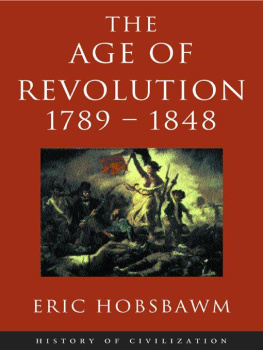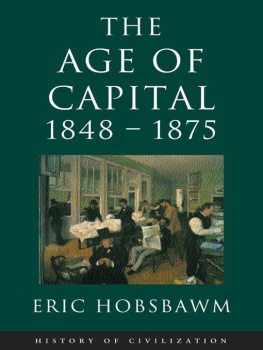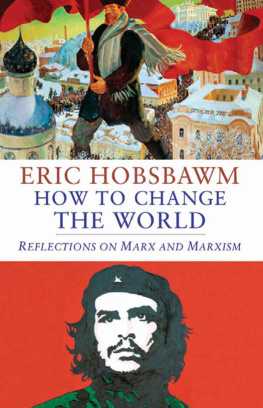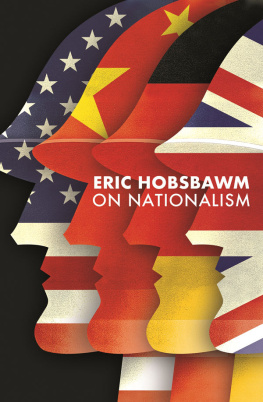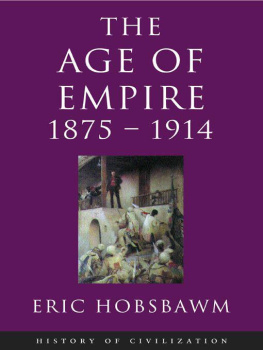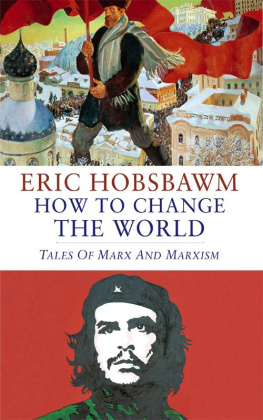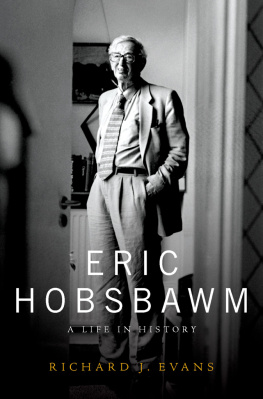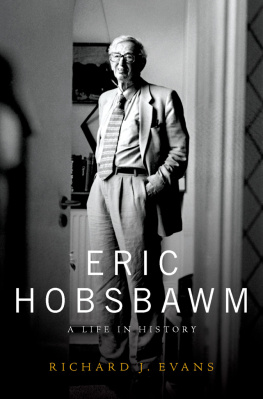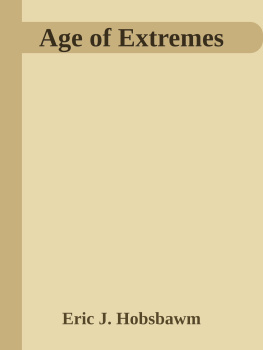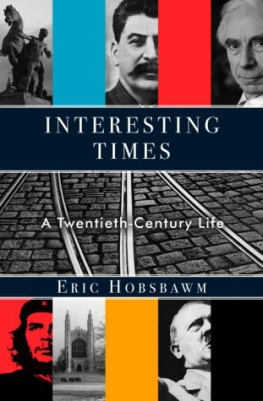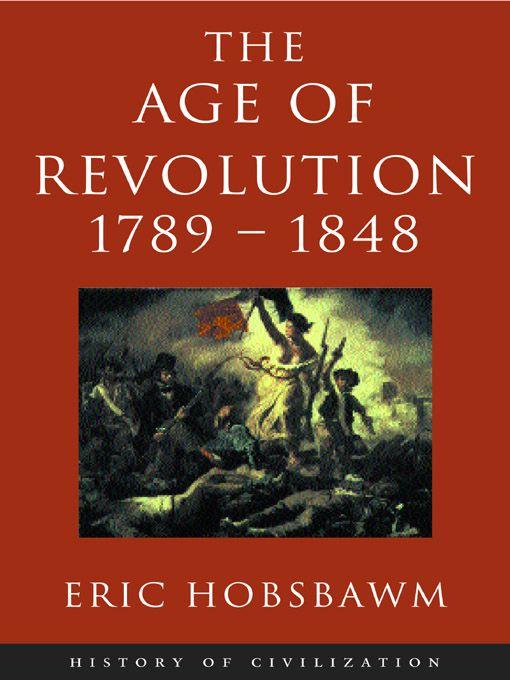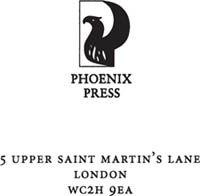Eric Hobsbawm was born in Alexandria in 1917 and was educated in Vienna, Berlin, London and Cambridge. A Fellow of the British Academy and the American Academy of Arts and Sciences, with honorary degrees from universities in several countries, he taught until retirement at Birkbeck College, University of London, and since then at the New School for Social Research in New York.
THE AGE OF
REVOLUTION
Europe 17891848
Eric Hobsbawm
CONTENTS
Also by Eric Hobsbawm
The Age of Capital 18481875 (Phoenix Press)
The Age of Empire 18751914 (Phoenix Press)
Age of Extremes 19141991
MAPS
Europe in 1789
Europe in 1810
Europe in 1840
World Population in Large Cities: 18001850
Western Culture 18151848: Opera
The States of Europe in 1836
Workshop of the World
Industrialization of Europe: 1850
Spread of French Law
PREFACE
T HIS book traces the transformation of the world between 1789 and 1848 insofar as it was due to what is here called the dual revolutionthe French Revolution of 1789 and the contemporaneous (British) Industrial Revolution. It is therefore strictly neither a history of Europe nor of the world. Insofar as a country felt the repercussions of the dual revolution in this period, I have attempted to refer to it, though often cursorily. Insofar as the impact of the revolution on it in this period was negligible, I have omitted it. Hence the reader will find something about Egypt here, but not about Japan; more about Ireland than about Bulgaria, about Latin America than about Africa. Naturally this does not mean that the histories of the countries and peoples neglected in this volume are less interesting or important than those which are included. If its perspective is primarily European, or more precisely, Franco-British, it is because in this period the worldor at least a large part of itwas transformed from a European, or rather a Franco-British, base. However, certain topics which might well have deserved more detailed treatment have also been left aside, not only for reasons of space, but because (like the history of the USA) they are treated at length in other volumes in this series.
The object of this book is not detailed narrative, but interpretation and what the French call haute vulgarisation . Its ideal reader is that theoretical construct, the intelligent and educated citizen, who is not merely curious about the past, but wishes to understand how and why the world has come to be what it is today and whither it is going. Hence it would be pedantic and uncalled-for to load the text with as heavy an apparatus of scholarship as it ought to carry for a more learned public. My notes therefore refer almost entirely to the sources of actual quotations and figures, or in some cases to the authority for statements which are particularly controversial or surprising.
Nevertheless, it is only fair to say something about the material on which a very wide-ranging book such as this is based. All historians are more expert (or to put it another way, more ignorant) in some fields than in others. Outside a fairly narrow zone they must rely largely on the work of other historians. For the period 1789 to 1848 this secondary literature alone forms a mass of print so vast as to be beyond the knowledge of any individual, even one who can read all the languages in which it is written. (In fact, of course, all historians are confined to a handful of languages at most.) Much of this book is therefore second- or even third-hand, and it will inevitably contain errors, as well as the inevitable foreshortenings which the expert will regret, as the author does. A bibliography is provided as a guide to further study.
Though the web of history cannot be unravelled into separate threads without destroying it, a certain amount of subdivision of the subject is, for practical purposes, essential. I have attempted, very roughly, to divide the book into two parts. The first deals broadly with the main developments of the period, while the second sketches the kind of society produced by the dual revolution. There are, however, deliberate overlaps, and the distinction is a matter not of theory but of pure convenience.
My thanks are due to various people with whom I have discussed aspects of this book or who have read chapters in draft or proof, but who are not responsible for my errors; notably J. D. Bernal, Douglas Dakin, Ernst Fischer, Francis Haskell, H. G. Koenigsberger and R. F. Leslie. Chapter 14 in particular owes much to the ideas of Ernst Fischer. Miss P. Ralph helped considerably as secretary and research assistant. Miss E. Mason compiled the index.
E. J. H .
London, December 1961
INTRODUCTION
W ORDS are witnesses which often speak louder than documents. Let us consider a few English words which were invented, or gained their modern meanings, substantially in the period of sixty years with which this volume deals. They are such words as industry, industrialist, factory, middle class, working class, capitalism and socialism. They include aristocracy as well as railway, liberal and conservative as political terms, nationality, scientist and engineer, proletariat and (economic) crisis. Utilitarian and statistics, sociology and several other names of modern sciences, journalism and ideology, are all coinages or adaptations of this period. So is strike and pauperism.
To imagine the modern world without these words (i.e. without the things and concepts for which they provide names) is to measure the profundity of the revolution which broke out between 1789 and 1848, and forms the greatest transformation in human history since the remote times when men invented agriculture and metallurgy, writing, the city and the state. This revolution has transformed, and continues to transform, the entire world. But in considering it we must distinguish carefully between its long-range results, which cannot be confined to any social framework, political organization, or distribution of international power and resources, and its early and decisive phase, which was closely tied to a specific social and international situation. The great revolution of 17891848 was the triumph not of industry as such, but of capitalist industry; not of liberty and equality in general but of middle class or bourgeois liberal society; not of the modern economy or the modern state, but of the economies and states in a particular geographical region of the world (part of Europe and a few patches of North America), whose centre was the neighbouring and rival states of Great Britain and France. The transformation of 17891848 is essentially the twin upheaval which took place in those two countries, and was propagated thence across the entire world.
But it is not unreasonable to regard this dual revolutionthe rather more political French and the industrial (British) revolutionnot so much as something which belongs to the history of the two countries which were its chief carriers and symbols, but as the twin crater of a rather larger regional volcano. That the simultaneous eruptions should occur in France and Britain, and have slightly differing characters, is neither accidental nor uninteresting. But from the point of view of the historian of, let us say, AD 3000, as from the point of view of the Chinese or African observer, it is more relevant to note that they occurred somewhere or other in North-western Europe and its overseas prolongations, and that they could not with any probability have been expected to occur at this time in any other part of the world. It is equally relevant to note that they are at this period almost inconceivable in any form other than the triumph of a bourgeois-liberal capitalism.

